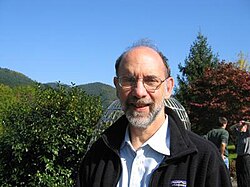Spencer Bloch
Spencer Bloch | |
|---|---|
 Bloch at Oberwolfach in 2004 | |
| Born | May 22, 1944 New York City |
| Alma mater | Harvard College Columbia University |
| Known for | Bloch–Kato conjectures |
| Scientific career | |
| Fields | Mathematics |
| Institutions | University of Chicago |
| Doctoral advisor | Steven Kleiman |
| Doctoral students | |
Spencer Janney Bloch (born May 22, 1944; New York City[1]) is an American mathematician known for his contributions to algebraic geometry and algebraic K-theory. Bloch is a R. M. Hutchins Distinguished Service Professor Emeritus in the Department of Mathematics of the University of Chicago.
Research
[edit]Bloch introduced the Bloch group in 1978.[2] He introduced Bloch's higher Chow group, a generalization of Chow groups, in 1986.[3] He also introduced Bloch's formula in Algebraic K-theory.[4]
Bloch and Kazuya Kato formulated the motivic Bloch–Kato conjecture relating Milnor K-theory and Galois cohomology in 1986[5] and the Bloch–Kato conjectures for special values of L-functions in 1990.[6]
Awards and honors
[edit]Bloch is a member of the U.S. National Academy of Sciences[7] and a Fellow of the American Academy of Arts and Sciences[8][9] and of the American Mathematical Society.[10]
He received a Humboldt Prize in 1996.[11] He also received a 2021 Leroy P. Steele Prize for Lifetime Achievement.[12]
At the International Congress of Mathematicians, he gave an invited lecture in 1978[13] and a plenary lecture in 1990.[9][14] He was a visiting scholar at the Institute for Advanced Study in 1981–82.[15]
References
[edit]- ^ Spencer Bloch CV, Department of Mathematics, University of Chicago. Accessed January 12, 2010
- ^ Bloch, S. (1978). "Applications of the dilogarithm function in algebraic K-theory and algebraic geometry". In Nagata, M (ed.). Proc. Int. Symp. on Alg. Geometry. Tokyo: Kinokuniya. pp. 103–114.
- ^ Bloch, Spencer (September 1986). "Algebraic cycles and higher K-theory". Advances in Mathematics. 61: 267–304. doi:10.1016/0001-8708(86)90081-2.
- ^ Daniel Quillen: Higher algebraic K-theory: I. In: H. Bass (ed.): Higher K-Theories. Lecture Notes in Mathematics, vol. 341. Springer-Verlag, Berlin 1973. ISBN 3-540-06434-6
- ^ Bloch, Spencer; Kato, Kazuya (1986). "p-adic etale cohomology". Publications Mathématiques de l'IHÉS. 63: 107–152. doi:10.1007/bf02831624.
- ^ Kings, Guido (2003), "The Bloch–Kato conjecture on special values of L-functions. A survey of known results", Journal de théorie des nombres de Bordeaux, 15 (1): 179–198, doi:10.5802/jtnb.396, ISSN 1246-7405, MR 2019010
- ^ Bloch, Spencer J. U.S. National Academy of Sciences. Accessed January 12, 2010. Election Citation: "Bloch has done pioneering work in the application of higher algebraic K-theory to algebraic geometry, particularly in problems related to algebraic cycles, and is regarded as the world's leader in this field. His work has firmly established higher K-theory as a fundamental tool in algebraic geometry."
- ^ American Academy of Arts & Sciences, NEWLY ELECTED MEMBERS, APRIL 2009 Archived August 8, 2013, at the Wayback Machine, American Academy of Arts and Sciences. Accessed January 12, 2010
- ^ a b Scholars, visiting faculty, leaders represent Chicago as AAAS fellows, The University of Chicago Chronicle, April 30, 2009, Vol. 28 No. 15. Accessed January 12, 2010
- ^ List of Fellows of the American Mathematical Society, retrieved November 10, 2012.
- ^ Annual Report of the Provost, 1995–96, University of Chicago. Accessed January 12, 2010.
- ^ American Mathematical Society Announcement, November 19, 2020. Accessed November 25, 2020.
- ^ Bloch, S. (1978). "Algebraic K-theory and zeta functions of elliptic curves". In: Proceedings of the International Congress of Mathematicians (Helsinki, 1978). pp. 511–515.
- ^ Bloch, S. (1991). "Algebraic K-theory, motives, and algebraic cycles". In: Proceedings of the International Congress of Mathematicians, August 21–29, 1990, Kyoto, Japan. Mathematical Society of Japan. pp. 43–54.
- ^ Institute for Advanced Study: A Community of Scholars
- James D. Lewis, and Rob de Jeu (Editors), Motives and Algebraic Cycles: A Celebration in Honour of Spencer J. Bloch. Fields Institute Communications series, 2009, American Mathematical Society. ISBN 0-8218-4494-6
External links
[edit]- Spencer Bloch personal webpage, Department of Mathematics, University of Chicago
- Spencer Bloch at the Mathematics Genealogy Project
- 20th-century American mathematicians
- 21st-century American mathematicians
- Algebraic geometers
- Members of the United States National Academy of Sciences
- Fellows of the American Academy of Arts and Sciences
- Fellows of the American Mathematical Society
- University of Chicago faculty
- Columbia University alumni
- Institute for Advanced Study visiting scholars
- 1944 births
- Living people
- Harvard College alumni
- Mathematicians from New York (state)
- Scientists from New York City
